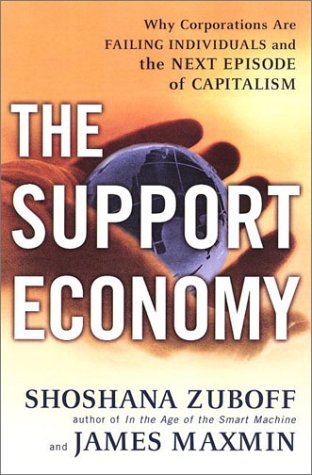Originally
published on Monday, March 29, 2004 in The Miami Herald
Ardent capitalists make the complicated comprehensible.
BY RICHARD PACHTER
rpachter@wordsonwords.com
 The
Support Economy: Why Corporations Are Failing Individuals and The
Next Episode of Capitalism. By Shoshana Zuboff and James Maxmin.
Penguin. 459 pages. (to purchase, click on the title or the
cover image.) The
Support Economy: Why Corporations Are Failing Individuals and The
Next Episode of Capitalism. By Shoshana Zuboff and James Maxmin.
Penguin. 459 pages. (to purchase, click on the title or the
cover image.)
I missed this book when it came out in hardcover late in 2002, but
after seeing it on a number of ''best of'' lists, I snagged a copy
when it was reissued in a paperback edition.
I'll admit that its title put me off. I expected -- due to inclusion
of the word ''support'' -- perhaps a neo-Marxist treatise on the
value of state ownership of businesses and a renewal of the welfare
state. But I couldn't have been more wrong. Zuboff and Maxmin are
ardent capitalists with an unshakable faith in the efficacy of the
system. Good thing, since they recognized that the system is not
working correctly, and that a widening gulf of dissatisfaction and
alienation is growing between consumers and the institutions that
serve them.
There have been other works commenting on this rift; several years
back, The Cluetrain Manifesto by Weinberger, Searls and Locke, eloquently
and concisely conveyed several important aspects of the changes
that have begun as business and government attempt to reconcile
these anomalies. But Zuboff and Maxmin, a husband-wife team, paint
a much larger picture, presenting a historical perspective and a
greater context for these changes that's supported with research
and analysis from a variety -- and diversity -- of sources.
THOROUGH RESEARCH
Zuboff, a professor at Harvard Business School, and Maxmin, an executive
and scholar, examine a number of very complicated and seemingly
contradictory forces and present a clear and compelling picture
of an economy that relies on a consumer culture increasingly frustrated
by the growing burden placed upon end users. Therein lies the ''support''
referred to in the title: the pair feels that the opportunity for
the economy lies in sustaining and facilitating consumers, and not
just selling them whatever products they demand at the cheapest
prices.
`INDIVIDUATION'
The authors refer to the phenomenon that is driving this change
as ''individuation.'' They demonstrate the historical progression
whereby people all over the planet have become increasingly insistent
that institutions and businesses with whom they deal allow them
the customization of their experience based on their own needs and
preferences, rather than attempt to treat them as a member of a
group.
This may seem self-obvious to most of us, but it's actually a fairly
recent development in the history of humanity for a number of religious,
social and economic reasons, as the authors explain in great detail.
As skilled as Zuboff and Maxmin are at making the complicated comprehensible,
digesting The Support Economy can be a lengthy and at times challenging
process, especially for readers who prefer that insights are presented
in smaller portions. But the authors are thinking big -- very big
-- as they make a case for nothing less than the refocusing, if
not the reinvention, of capitalism, and are compelled to present
their persuasive argument based on facts, not intuition or politics.
Still, it's clear that they are passionate about their findings,
and this book will no doubt influence and inspire others to extend
and amplify their philosophies, and maybe even implement them.
Like business books? Join the club.
|

